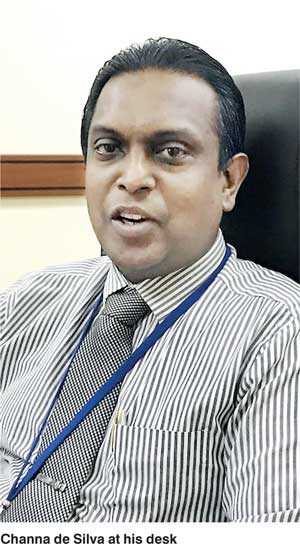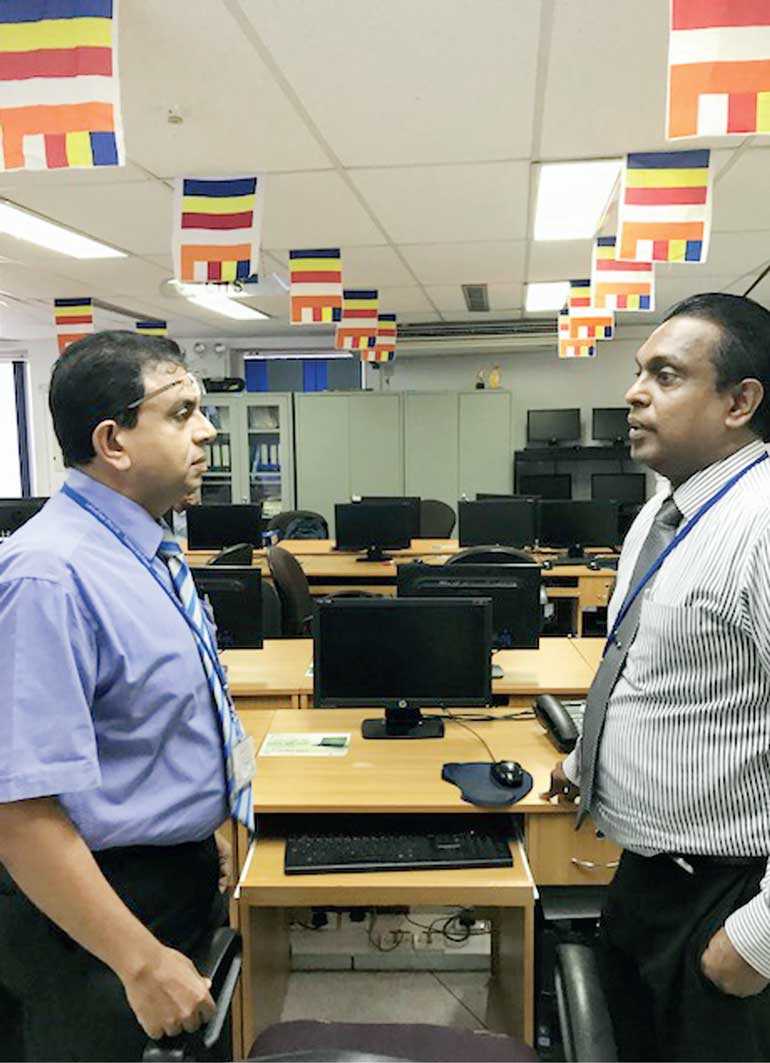Tuesday Feb 17, 2026
Tuesday Feb 17, 2026
Monday, 28 May 2018 00:10 - - {{hitsCtrl.values.hits}}
Technology to ease lives
Channa de Silva, CEO of LankaClear, Sri Lanka’s official clearing and payment services provider, declares convincingly: “I firmly believe that technology should be for improving people’s convenience.”
Channa is correct. For millennia, mankind has invented new technology to ease its life. Oxford-trained historian Noah Yuval Harari, documenting the history of mankind in a book titled ‘Sapiens’, has provided proof of this. He has noted that from the time the hunter-gatherer Homo sapiens got into agriculture some 10,000 years ago, their worldly progress was always marked by the invention of new technologies that superseded the old ones.

The list is unending, but some important milestones have been the invention of the plough, wheel, animal-driven cart, motorised tractor, motorised vehicle, aeroplane and fuel-driven ship. Today, with advancements in information and communication technology or ICT, and mankind’s breakthrough research in creating artificial intelligence or AI, all these previous inventions appear to be child’s play.
Every morning, we wake up to the news of a big thing created in this or that part of the world. Hence, world nations today are in a race to create the next big thing. Sri Lanka’s future prosperity crucially depends on its ability to join this race, and adapt at least technologies developed elsewhere, until it gains capability of coming up with its own new creations.
Need for sophisticated and reliable payments systems
An important area of technology that would ease life immensely is the one involving the sophistication of payment systems.
Money was invented some 5000 years ago, but there was no any global technological breakthrough until paper money was made popular in the last 300 year period – again, an adaptation from the Chinese, who had invented it in the 9th century CE. But the payment systems became sophisticated only within the last 50 years, when value transfer by cheque was gradually replaced by electronic fund transfer systems.
Today, with the Internet, online fund transfers at the speed of light have become the order of the day. The sophistication, reliability and safety of payments systems have become so important today that it is used as one of the criteria to judge the stage of development of a nation. Channa’s mission as the head of LankaClear has been to take Sri Lanka to this stage.
LankaClear, the best working public-private-partnership
To find out more about what he has done to accomplish this mission, I visited LankaClear, located on the 18th floor of the Bank of Ceylon Head Office in Fort.
For me, it was like coming home, since it was a team of officers under my leadership that brought LankaClear to existence as a public private partnership or PPP in 2002, under the Central Bank’s modernisation project that was being implemented at that time.
The other members of the team were the late K. Sivagananathan, formerly a Deputy General Manager of the Bank of Ceylon but at that time an advisor in the Central Bank, Priyantha Fernando, Director of Information Technology of the Bank who later retired from the Bank as its Deputy Governor and the late Justin Wickramasinghe, Manager of the Bank’s Automated Clearing House or ACH, predecessor to LankaClear. Justin was assisted by his Deputy, the late Ariyawansa. We all worked under the guidance of Governor A S Jayawardena to create this new institution.
Central Bank relinquishing ownership and becoming only a regulator
We created LankaClear by divesting a part of the Central Bank’s ownership in ACH to commercial banks. With its new membership, it was registered as a private company with the Registrar of Companies.
An MOU was signed among the three parties: the Central Bank, member commercial banks represented by Sri Lanka Banks Association or SLBA, and LankaClear, to provide clearing and payment services in Sri Lanka under Central Bank’s overall supervision. Thus, the Central Bank, which was earlier both the owner and regulator of clearing and payments services, was now to function only as the regulator cum supervisor.

Averting an explosive labour dispute
However, when we proceeded with the establishment of the new PPP, commercial banks functioning as a group under SLBA’s umbrella threw a spanner before us. That was to convey their refusal to take in the staff of ACH, who had specifically been recruited to that outfit to run the system. There was refusal to take them back to the Central Bank as well on account of the lower entry qualifications they had possessed. They were, therefore, like stateless people, belonging to nobody. It created an explosive situation, and could have been ignited by interested political elements by exploiting their grievances. I sensed that it should be defused as fast as possible if LankaClear was to be born.
The best solution was to take them back to the Central Bank despite their lower entry qualifications. For that, we had to win both the Monetary Board and trade unions to our side. I recall visiting ACH practically every day to negotiate with the staff for a harmonious solution.
Finally, we succeeded in winning their consent to join the mainstream Central Bank by offering them better career prospects there, including opportunities for foreign training. This was successfully sold to both the Monetary Board and the trade unions. In that way, we were able to avert the dreaded labour dispute, and allow LankaClear to mark out its destiny with its own business strategy.
LankaClear was a daring experiment with a lot of dreams but paucity of resources. I was happy to observe that its successive managements had made those dreams a reality today. In 2017, its four key products have created value amounting to Rs 11 trillion, which is about 90 % of the total Gross Domestic Product or GDP of the country.
A changed destiny due to youth insurrection
Channa has given leadership to LankaClear since 2015. I asked him his background qualifications to head an outfit that uses high technology. He clarified: “I did my A-Level in 1989, when the whole country had been burning with the youth insurrection at that time. Hence, I couldn’t join a local university. So, I proceeded to the USA and joined its State University of New York, better known by its acronym SUNY, to read for a degree in electrical and computer engineering. However, that was a completely new area for me because I had studied bio sciences for A-Level to join a medical school.
“But my destiny had directed me to the correct degree programme. At SUNY, we didn’t study only computer science. In terms of their vision of developing creative minds, we had to study arts subjects as well. I completed a Master’s degree in the same field at SUNY before returning to Sri Lanka. In hindsight, I think that the youth insurrection did good to me. If it were not there, I would have ended up as a physician, and you wouldn’t have been able to speak to me here today,” he added in a lighter vein.
In addition to these qualifications in computer engineering, Channa completed an MBA at the Postgraduate Institute of Management of the University of Sri Jayewardenepura to develop his strategic, marketing and managerial skills.
Returning home after studies in the States
Usually, a person who goes to the States to study computer science does not return to Sri Lanka. But Channa was different, and he returned to Sri Lanka. I asked him why he wanted to be an exception. “I wanted to come back and begin a new career here,” he explained. “I did so many new things. I was associated with building up the first ever internet company in Sri Lanka in 1995. That was long before even SLT ventured into the field. I also ran a web hosting company too. They were completely new areas of technology application in Sri Lanka. I’m glad that I was able to be a pioneer in Sri Lanka’s move toward ICT.”
Replacing the primitive cheque payments system
Global payment systems are going through revolutionary changes year after year. Countries have to keep pace with them in order to provide convenience to people. Fifty years ago, the cheque was the main mode of payment in any country. But today, it is a primitive instrument, destined to meet with a natural death.
Cheques entail enormous costs on the cheque writer, recipient and the national clearing system. The writer has to keep the blank cheque books in safe custody, take care when writing cheques to satisfy the requirements of both the paying and receiving banks, send the cheque by registered post if not handed over to the recipient, and reconcile the cheque payments in his cash book. The larger the number of cheques written, the higher the costs involved.
The recipient has to deposit the cheque in his bank, wait for the realisation of money and reconcile his cash book after he receives the proceeds.
The national clearing system has to work day and night to earn the trust of both banks and their customers with respect to reliability, accuracy, swiftness and safety. Hence, cheques are gradually being replaced by electronic online payments systems.
In order to dissuade cheque writing and promote safe and swift payments, in 1995 ACH started an offline bulk payment system, called Sri Lanka Interbank Payment System or SLIPS. This was popular among bulk payers, but one hitch was that it was offline and the payers had to lodge a CD containing payment details physically with their bankers.

Channa de Silva discussing an issue with a colleague
SLIPS, which was offline for many years, is now online
I asked Channa whether SLIPS still has the same problem. “The cheque today is a credit instrument, rather than a payment instrument,” he answered, pointing to the popular use of post-dated cheques by traders to assure payments in the future. “We’ve now made SLIPS online and payers can deliver the details of payments to their bankers in electronically certified and encrypted data pack through secured data lines. It’s the cheapest, quickest and safest mode of payment, since the value is credited to the recipient on the same day and we charge a nominal amount for the service.”
JustPay and LankaPay, two solutions to predicament of retail payers
Definitely, SLIPS is good for bulk payers. But it is not the end answer to the problem faced by retail payers of large amounts. They could use the SWIFT facility offered by the Brussels-based Society for Worldwide Interbank Financial Telecommunications, but it is enormously costly specifically for small retail customers. Even for large retail customers, SWIFT is unaffordable when it comes to making payments to or from Governments. Hence, a solution has to be found for the problem faced by large as well as small retail payers. I asked Channa how he has tackled it.
“We’ve introduced two services. One is for small retail payers. It’s based on mobile phones and called ‘JustPay’. It’s presently available with a few applications, but will be fully operative by 2020. You can get money from your bank account and make payments to a merchant or any other party. Again, we facilitate a secured payment for a small fee.
“The other is for large retail payers and is called LankaPay. LankaPay is in fact the Central Bank authorised Sri Lanka’s national payments platform. Irrespective of the value, the charge for any payment via LankaPay is just 35 rupees.”
Customs is on board with LankaPay
Both these solutions are novelties added to Sri Lanka’s payments system. If the country wishes to improve its ranking in ease of doing business as well as competitiveness and promote e-commerce, these payments innovations are a must.
The biggest beneficiary of LankaPay is the Government. Historically, citizens had to make payments to the Government either in cash or by cheque, but both are cumbersome and primitive. Channa continued: “Already, Customs uses LankaPay to receive customs duties from payers. It’s convenient to the Customs, customers and banks. In addition, BOI and Motor Vehicle Registrar’s Department have also been connected to it. Inland Revenue, Excise and Immigration Department are also planning to join it pretty soon.”
Central Bank’s oiling of LankaPay through intraday liquidity
The advantage for LankaPay is that it is operated through the active participation of commercial banks and, if there is a liquidity issue for them to effect a large scale payment, the Central Bank is there to provide intraday liquidity to them.
This arises when the paying commercial bank does not have money to pay, though the customer who makes the payment may have a credit balance in his account. If one bank fails to pay, it creates a ripple effect on other banks forcing them also not to pay. At that point, the whole payments system gets into a gridlock where no bank can move either forward or backward.
But when the Central Bank advances liquidity funding to the bank which is unable to make the payment due to lack of liquid funds, the gridlock is dissolved. This is a critical support for banks in Sri Lanka which are unable to raise funds from foreign markets as in the case of large international banks. In this sense, a national payments system functioning under the patronage of the Central Bank is a plus point.
Enormous opportunities through mobile phone applications
Channa’s vision is wider than LankaClear. He said: “We have to make cashless payments popular and inclusive. The catch word there is trust. If we breach trust, nobody will believe in us. So, the system should be secure enough to earn trust from its users.”
He continued his explanation: “Then, this mobile phone technology can be applied to anything to provide convenience to people. A simple application, for instance, is mobile-phone ordering of a meal. I’ve seen many housewives, after a hectic day at workplaces, standing in a queue at fast food joints to collect their orders before they go home. If this mobile-phone facility is available, they can place the order before they leave the workplace and have it home-delivered by the time they reach home.”
Channa continued: “It will facilitate people to save time, businesses, especially small businesses, to bloom and economy to prosper. If Sri Lanka is interested in creating value and generating prosperity for people, a sophisticated and advanced payments system is the gateway. Our duty is to open that gateway and keep it oiled for smooth functioning for the common benefit of all.”
Presently, smartphones help people to order cabs. Channa’s aim is to help mobile phone users, for example, to search for and engage even a coconut-plucker to climb coconut trees and pluck coconuts. Such organised ‘skilled-men supply services’ are not very far from reality today.
Channa is a young CEO. But he has already made an invaluable contribution to designing Sri Lanka’s future.
W A Wijewardena, a former Deputy Governor of the Central Bank of Sri Lanka, can be reached at [email protected]